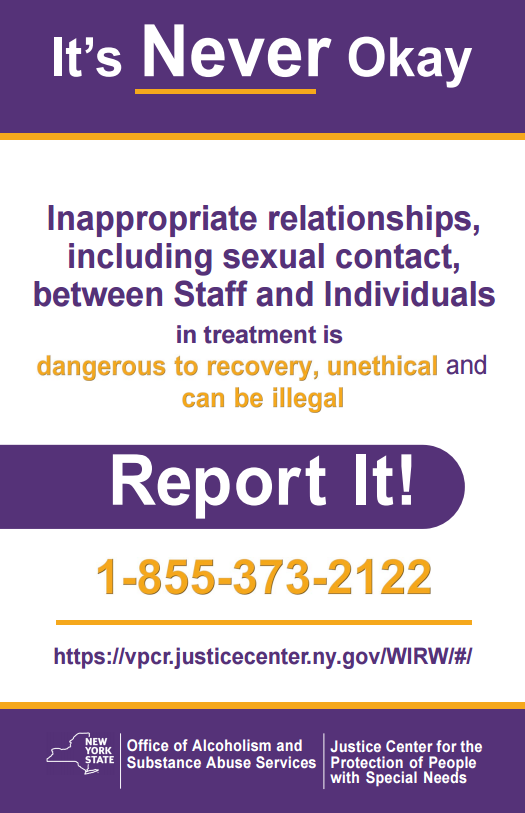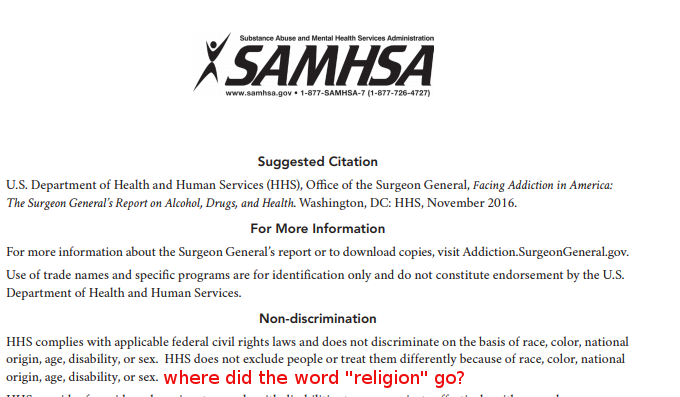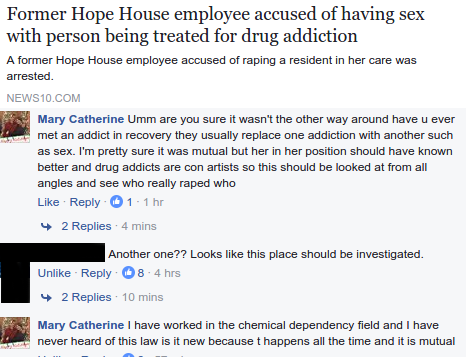I found this site about “Ethics” by an “ethics training and consultant firm” in Alexandria, VA. There was a glowing article about what a wonderful organization AA is. I thought I’d set him straight because his “About” page says we don’t have to agree. He shut me down pretty quick though without seeming to have considered any of the points I raised. Much like the NYS Education Department and Samaritan Institute. I write this blog to try to explain how people can become so personally invested in ideology that it becomes impossible to even consider arguments to the contrary.
I post my whole interaction with him below, but here’s a summary of his conclusion:
I’m full of shit,12 Step programs are a godsend for millions with an incurable disease. I obviously have issues with AA. AA doesn’t lie. Don’t post here again. Good day, sir!
Why would an ethicist be completely uninterested in examining ethical violations so clear as this: National Association of Social Workers Ethics Code class action complaint against social workers in Alcohholics Anonymous.
An ethicist should be aware that when a party has been presented with facts and chooses to disregard them, that can amount to negligence. I hope he would not advise his clients to delete and ignore important information required for ethical choice, especially since he “has led non-profit organizations devoted to education, public policy research, legal services and health.”
So, here’s how it went. Maybe I didn’t have tact. I didn’t think I needed to because he’s not a member; he just LOVES AA and how ethical it is and doesn’t know about its problems yet, right? After this exchange, I’m pretty sure he’s not swayed by facts.
Tom
Most people that end up in AA are either sent there by judges or rehab programs unethically. It’s a first amendment violation as well as usually a scam, since rehabs have the appearance of medical treatment, charge a lot of money to medicaid and then mostly just ship people to free AA meetings and don’t even manage detox. The whole industry is plagued by the very fundamental ethical breach which is pretending that 12 religious ideas is ‘treatment’ for a ‘spiritual disease’ which can only be arrested by the 12-steps.
Jack
September 3, 2016 at 6:35 pm
MOST people aho go to AA are ordered there? Absolute and complete nonsense. Not even close to true. Where did you get such a silly idea?
Tom
September 3, 2016 at 7:15 pm
For many people it is the way to stay out of jail, keep their family, keep their job, or not end up in jails, in institutions, or dead. In many cases this is only because those families or courts have been told that forcing people into regular AA meetings or else ‘lovingly detaching’ is the only ethical thing to do and the only way that person will ever get better or stay better — By AA members who are following the 12-step tradition proselytizing to professionals and patients. Thus the rehab industry has a constant source of free word-of-mouth advertising, because AA meetings are training sessions for formulating a personal story of debauchery, disaster/miracle, and redemption.
The 12-step rehab industry and the AA 501(c)3 are some of the most unethical organizations in the world. You can see ‘How it Works’ in a documentary called The Business of Recovery and The 13th Step. What is wrong? Well, AA seems to give its members the sense that if they don’t participate in and proselytize for and defend their little religious program, most ‘alcoholics’ will die; for one. There are many such simple flat out lies, such as the “rarely have we seen a person fail” lie. They also refuse to provide members with new scientific information about alcohol use or empirical data about what is normal. They do not have a sexual harassment policy and instead have unspoken traditions not only of “13th stepping” but also of blaming the victim for being upset. This blaming the victim dynamic is also very apparent in the rehab industry where when treatment fails (and it nearly always does, or worse) the client is told to either come back for another round or shut up because they obviously didn’t put enough into it.
I could go on but I don’t need to.
Jack
September 3, 2016 at 8:25 pm
Yeah, don’t, because you’re full of shit, to be blunt, as you showed in your initial post. 12 Step programs give hope, support and assistance in dealing with an incurable disease. I have a lot of experience with AA (though I have never personally been a member). It’s not for everyone, but it is still a godsend for millions, and your characterization is false. I don’t know if you had a bad experience or are a flack for a competitor. There is no “rarely have we seen a person fail” lie—AA and ALANON make it very clear that anyone can relapse any time. The point is that doing so isn’t “failure.” It’s the disease.
I don’t know your motives, but this is the last anti-AA rant you get to post here. Got it: you have some issues with AA. Your characterization is absurd, however.
My Rebuttal
Instead of rehashing the whole debate here, I’ll just link to the original, because it did go on for a while longer before I finally “apologized” and he forgave me. https://ethicsalarms.com/2011/02/07/alcoholics-anonymous-and-ethics/






